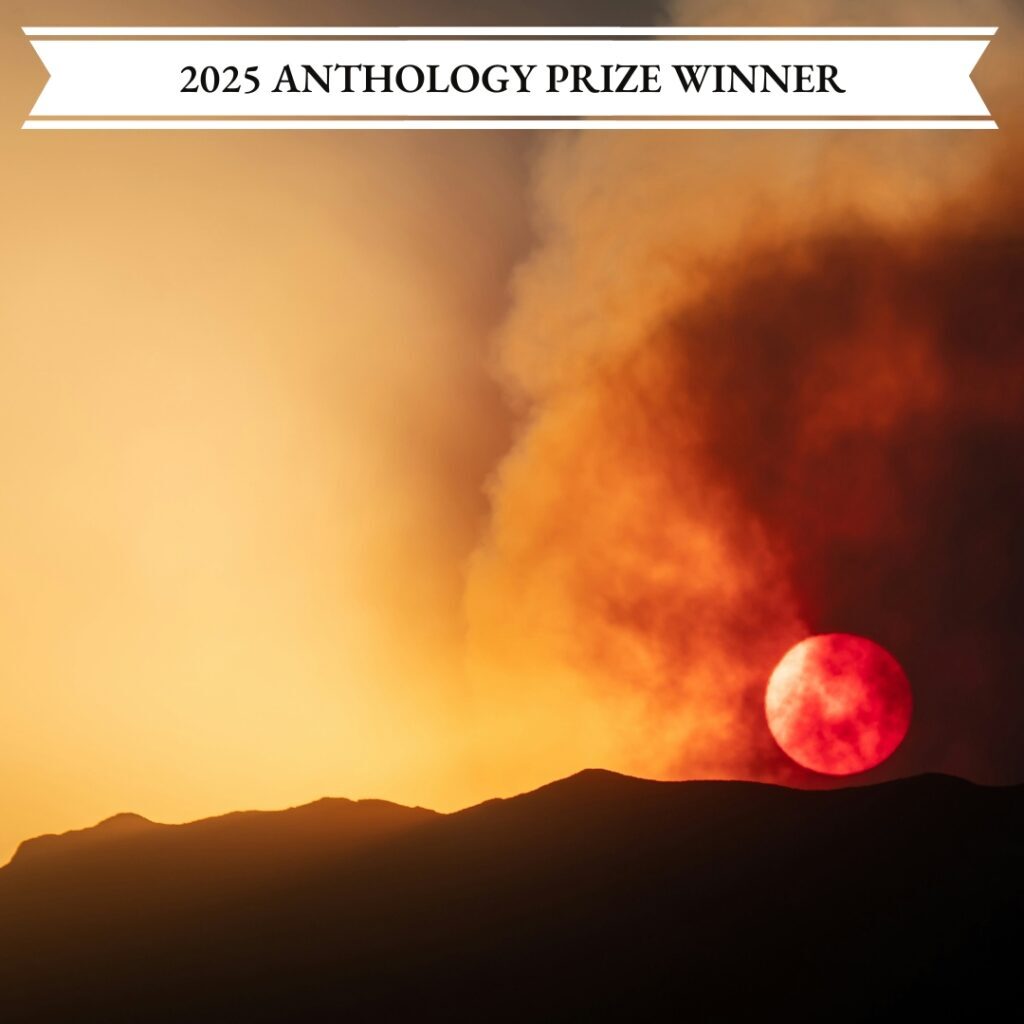
Weed
The sky went dark on a Monday, pushing the straining sun behind a curtain of smoke, creating an opaque swath of grayness where light would catch – lost – never making it to the retina, never lighting up the things we had been used to seeing: tree leaves in the sunlight, a glint off the lake, a squinty view of a deer through the trees, the forest floor spotted and daring looking, and so, in this relative darkness – thick and vast – we see with our hands out in front of us, using them as a guide, a buffer, a shield against a stumble over the rake in the yard, the log in the road, the slick of wet leaves on the front path, our own feet, ourselves – clumsy and fumbling as ever.
It’s only been a week since the smoke and its particles put up a blanket across the sky. It’s only been a week and, already, I struggle to recall the exact way the sun used to glow through the cluster of birches off the back side of the house, the dark woods backlit behind them. The smoke and the flames have been on the news for months, years. The fires continue to burn and move, overtaking everything, and while they have never been where we are, this time, their effect is inescapable, and one day we woke up to a sky unchanged by morning light, and we wondered but didn’t speak our questions out loud. The next night we stayed up to watch the sky, absent of stars, never turning into morning. Then the following night, we stood on the back stoop, waiting to see one single star. Hank grabbed his headlamp and said, “Go to bed. I’ll be up in a bit.” I watched him from the bedroom window, on all fours, his face close to the ground, studying something, the brightest setting shining from his forehead. I thought I heard a yell in the dark, but I went to bed anyway.
The next morning, I woke to his side of the bed undisturbed and the truck gone from the garage, and now, the sky is dark and the house is empty except for me and the dog, and I work at remembering the way the street looked with the light of an unshadowed sun shining through the branches onto the dirt, brightening the way ahead.
Last week, before the sky went gray, Hank had razed a long section of ground in the yard. He had wielded the machete he bought at the flea market in Brownfield, hacking at a particular green stalk that sprouted in the dark soil. With every swing of the metal, rocks and pebbles – disturbed from the earth – flew all around him with vengeance. The little bits of green – the offenses – threatened the well-being of Hank’s beloved roses and blueberry bushes, his tulips and herbs. I could hear him ranting about the roots and sprouts and green bits, how he knew they would choke the life out of the plants he’d chosen, the ones that belonged. As if he knew the world was about to change and there was no way he’d stay and live in it with me and his doomed flora, Hank took the truck and hit the road.
Now, I stand at the edge of the property and turn my light to the brightest setting, checking again to see if what I think I see is true, if growing out of the black dirt – where he had stamped down and beaten back every stem and every green speck with his worn work boots – there are in fact thirty or forty little green shoots a couple centimeters high; the weed is not obliterated; even in the grayness, it is very much alive. And, considering the massacre of leaves and stems, branches and soil that took place here only a week ago, a barely comprehensible and resilient little thing.
My arms are folded against the morning chill, and I hear Hank and his friend Vesta “the Garden Guru” talking a month or so ago – their words cutting through the emptiness of the dark yard: “invasive”, “not from here”, “alien”. I see the ways they averted their glances, avoiding my hair – thick and black, long around my shoulders; my eyes – narrow and dark; my skin – olive in the sun, contrasting me with all the whiteness: her, Hank, every neighbor for miles, the shutters on the house. She had spat her words: “That weed is downright stealing the space of what’s ours. You know what I mean.” I did, and she knew it. And now, watching the little plant push through the soil, I laugh; it bursts from me in the silent woods – a loudness echoing through the trees.
Beth Cho Little has an MLitt with distinction (fiction) from the University of St. Andrews in Scotland and an MFA (Writing for Young People) from the Solstice MFA Program of Lasell University. Beth’s work has been published in the anthology Somebody’s Child: Stories About Adoption, Eastown Fiction, the YA Review Network, and Hunger Mountain. She was awarded an SCBWI Magazine Merit Honor in 2016. Her most recent piece of short fiction “On Falling in Love at Boarding School” won the 2023 Flash Fiction Contest for Pigeon Pages, judged by Gina Chung. She attended the Kenyon Review Writers’ Workshop in summer 2023 and the Tin House Summer Workshop in 2024.
Submit Your Stories
Always free. Always open. Professional rates.
